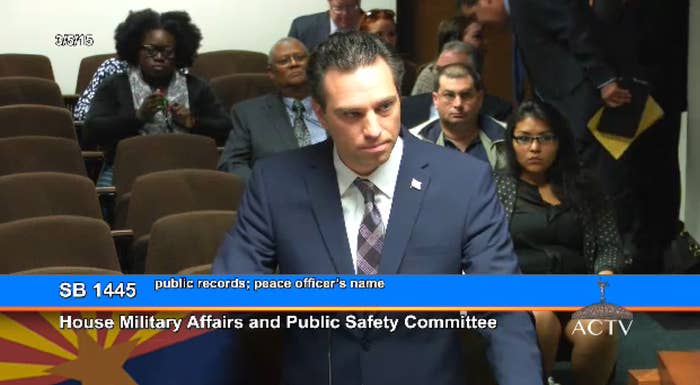
Arizona's Republican governor has vetoed a controversial bill that would have barred the release of the names of police officers involved in lethal shootings. The bill, which had broad support in the state legislature, was inspired by two incidents in which unarmed suspects were killed by police.
"I know the goal of this legislation is to protect officers and their families, and it's a goal I share," Gov. Doug Ducey said in a letter explaining his decision. "Unfortunately, I don't believe this bill in its current form best achieves the objectives we share, and I worry it could result in unforeseen problems."
Ducey also wrote that he believed the ban could increase public anger over an officer-involved shooting and put other officers' "safety on the line." New York City police officers Wenjian Liu and Rafael Ramos were killed last December by a man who had threatened to kill police officers in response to the deaths of Eric Garner and Michael Brown, both unarmed black men killed by police.
The bill's sponsor, Arizona Republican State Sen. Steve Smith, testified before a House committee on March 5 that he wanted to make sure that "we don't maybe succumb to maybe the court of public opinion too quick" when "you have an officer-involved serious or deadly shooting." In that circumstance, Smith said, "We want to protect the officer and their families from any undue or unnecessary harm that might come to them."
Smith's bill, SB 1445, which had been backed by police unions in Arizona, would have prohibited the release the names of officers involved in shootings for 90 days. Legislators adjusted that waiting period to 60 days, and last week the bill passed easily through state legislature, 44 votes to 13 in the House, 20 votes to eight in the state Senate.
As BuzzFeed News reported on Monday, March 30, hundreds of protesters showed up at the Arizona Capitol last week to denounce the bill.
"The intent of keeping officers safe is good intent," said Jeremy Helfgot, a member of Phoenix's Human Rights Commission. "But I think this bill ultimately does the opposite. A public that's being informed is a confident public. They're going to be able to make rational smart good decisions. A public that's thinking information is being withheld is going to be distrustful and afraid. And that distrust and fear leads to escalation."
That the bill even reached the governor's desk reflects a sentiment in Arizona, and perhaps across America, that the real problem with police shootings is the threat posed to the safety and reputations of officers by those angered by such incidents. This threat, Smith argued, became especially clear in Arizona over the last year or so.
"This was the genesis of two cases in Arizona," Smith told the House committee.
In both cases a police officer in Arizona shot and killed an unarmed person of color under questionable circumstances. And yet, the bill's passage suggests, the lesson state legislators drew from those killings was that it was the police who needed more protection.
"This is about protecting those who protect us," Smith told BuzzFeed News. "Is it gonna take an officer to be convicted in the court of public opinion, without due process, and slain in their home? Or a family member shot and killed? Or an officer protecting their home in front of the protesters and shooting them in self-defense?"

In January 2014, local authorities pursued 40-year-old Manuel Longoria through Eloy, Arizona. The car Longoria drove had been reported stolen. During the pursuit, an officer radioed that Longoria "says he wants us to shoot him." The chase lasted more than an hour before Longoria crashed. Seconds after Longoria got out of the car, officers fired bean bags and a Taser at him. Video of the incident showed him stumbling toward the car. Somebody shouted, "He's got a gun." Longoria put hands up, and less than a second later a Pinal County sheriff's deputy fired two shots. Police did not find any weapon.
The sheriff's office claimed that Longoria had told them he had a gun, and that the deputy opened fire because it appeared that Longoria was reaching into his car. Sheriff Paul Babeu told the local CBS affiliate that Longoria's death was "suicide by cop." A former Arizona Department of Public Safety officer told the news station "that's not suicide by cop, that's just murder."
But, State Sen. Smith told the committee, "What ensued next was pretty reprehensible. And so you had some people saying, 'Well wait a minute, this person was a minority that was shot and we wanna know who the officer was and we wanna know if it was race-induced.'"
The sheriff's office was then "essentially forced by threat of lawsuit to hand that name over," Smith said. "And then what happened next was even worse."
The deputy received death threats on social media, according to Smith. "To the point where the Pinal County Sheriff's Office had to put a 24/7 detail on the deputy's house to protect him," Smith said. "Didn't do a thing wrong. Did his job. But it didn't stop the whimsical mob that wanted to prosecute him in the court of public opinion."
"And not only that," Smith continued. "Just a few short months ago we saw another similar incident in Phoenix."
In December, an officer approached 34-year-old Rumain Brisbon as he sat in his SUV in front of an apartment complex. Police later said they'd gotten a tip that a drug deal had taken place in the area inside an SUV. Brisbon ran off and the officer chased. The officer caught him and there was a scuffle. Brisbon put his left hand in his pocket. The officer grabbed the hand and, as he later stated, thought he felt the butt of a gun inside the pocket. The officer shot Brisbon twice in the torso.
The item in his pocket had been a pill bottle filled with oxycodone.
"Same thing, some came out to protest and demanded that the release of the name came out, they wanted to find some connection, whatever that might be," said Smith. "Forced the name out. Subsequently, that officer was threatened. Threats to march on his home, with a mob."
Nobody marched on the officer's home. There are no examples in Arizona of an officer involved in a shooting getting killed in retaliation. And, at this hearing and others, none of the bill's supporters were able to cite a single example anywhere in America of an officer involved in a shooting being harmed in revenge. The bill would not have prevented the shootings of NYPD officers Liu and Ramos, for example. But the possibility of retaliatory violence against specific officers was enough, Smith argued.
"I'm not aware of any officers being directly maimed or physically assaulted," Smith told BuzzFeed News. "But I will reiterate: Are threats not enough?"
Speaking to the House committee, Smith laid out how those threats might manifest.
"What would have happened if you had 100 to 200 people pushing against an officer's door, pushing against their window, saying something to their family, saying something to their wife, saying something to their children," Smith said. "Maybe, just maybe, that escalates things a whole heck of a lot more than if we just say, 'Time out, let's have a sensible, breathing, cooling-down process.'"
In addition to the American Civil Liberties Union, the NAACP and other local groups stood against the bill, arguing that keeping an officer's name secret would only heighten the tension and anger in the weeks after a police shooting.
Even without the bill, the governor noted in his letter, police chiefs can withhold an officer's name even in the face of a freedom of information request. The Arizona Association of Chiefs of Police came out against the bill because it would take the choice out of their hands.
"There are many examples of our police departments exercising this authority in a manner that protects the officer's identity while ultimately providing disclosure after the situation has cooled," Ducey said. "Setting an arbitrary 60-day benchmark for release of names would limit their ability to best manage these often tenuous situations and result in unintended consequences."
